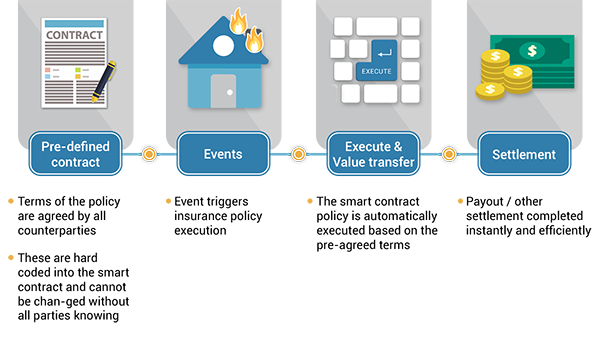Smart Contracts Implementation and Applications

Smart contracts have a broad range of possible applications. As well the immediately imaginable tasks, like business data management or insurance, there are some more creative and exciting uses of smart contracts.
Smart contracts in insurance policies
The current problem with insurance policies is that the claims process can take weeks or even months to be paid. The process is still very manual and requires a large degree of human action. This adds up to a lot of administrative costs, which result in higher premiums for customers. Insurance companies can automate insurance policies by writing them into a smart contract.
When the input conditions of the smart contract change in an insured event, for example in the event of a catastrophic natural disaster, then the claims process is triggered immediately. Measurable parameters of the event can be recorded onto the blockchain. Variable with the complexity of the smart contract, as the parameters cross certain pre-agreed thresholds, the claims process is triggered immediately and the exact amount of financial payout can be delivered without need for human-driven intervention.
Not only does the smart contract reduce the administrative costs associated with fulfilling such policies, but transparency and trust in the process is visible to all stakeholders and all regulatory bodies – thanks to the distributed nature of the smart contracts on the blockchain.

Smart contracts and copyrighted content
In an industry, such as the music industry, either the artist themselves or a publishing company own the rights to the content put out. As such, these copyright privileges allow the holder to receive a royalty fee every time this content is used for commercial purposes.

The issue with the current system is knowing who owns these rights and then to ensure that royalty payments are distributed to all who are legally obliged to receive payment. A smart contract solution here, built on a blockchain, would keep track of all ownership rights. This ensures trust in true ownership – as any changes to the data on the blockchain requires a consensus from all parties on the network.
As a consequence of knowing true ownership at all times, the same smart contract would ensure that a royalty payment is generated and paid in real time – with the added benefit that as the transaction is broadcast across the blockchain, every relevant stakeholder can instantly reflect this on their accounting.
Smart contracts in the Internet of Things
The Internet of Things will bring the era of everyday devices having the ability to connect with the Internet, and therefore to blockchain systems. Currently, for example, your parcels can get lost in the post. In an Internet of Things connected world, with sensors every step of the way – from the shelf in the warehouse, flying through the air on a delivery drone, right to your doorstep – a fully self-automated system will ensure this doesn’t happen.

Each sensor forms its own node on a blockchain and Smart contracts can record “possession” of the device to each individual sensor (and subsequent location). A barcorde / NFC chip / other tracking device on the package will be read at each sensor on the way to your house. Each time it is read by a new sensor, it’s location is broadcast to and agreed on by all the IoT participants on the blockchain.
As each recording of the package’s location is encrypted into the blockchain in a specific order, there is no securer system for tracking packages. A smart contract then keeps tabs of “possession” all the way along the line, solidifying the trust of exactly where to find the package.
Smart contracts seem to be the end to trust related barriers in business and financial relationships in general, but just like every work of science or art, there are always two sides. The good and the bad. Smart contracts can be very beneficial but at the same time there are so many loopholes that make it rather imperfect.


Excellent publication, you explain very well what an intelligent contract refers to, it seems to me that more and more were implemented, they have won a lot outside and particularly I think it is better to do business or deals without an intermediary in between. This way we will be safer!
Yeah. The major aim of smart contracts is to eliminate trust issues when it comes to transactions.
You made a full copy of the text, images, links ... EVERYTHING!
https://www.skalex.io/support/blockchain/smart-contracts/use-cases/
Also, despite committing total plagiarism, do you use our image?